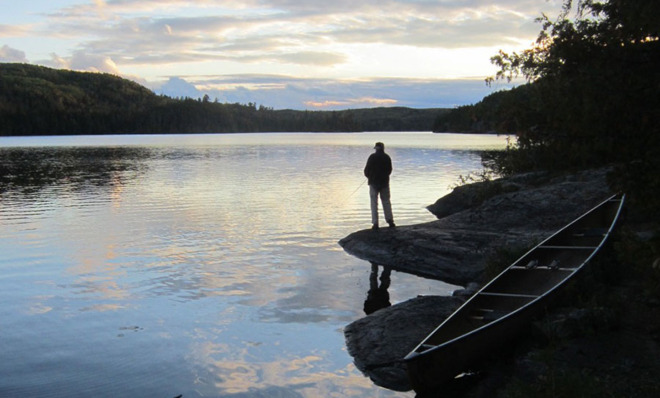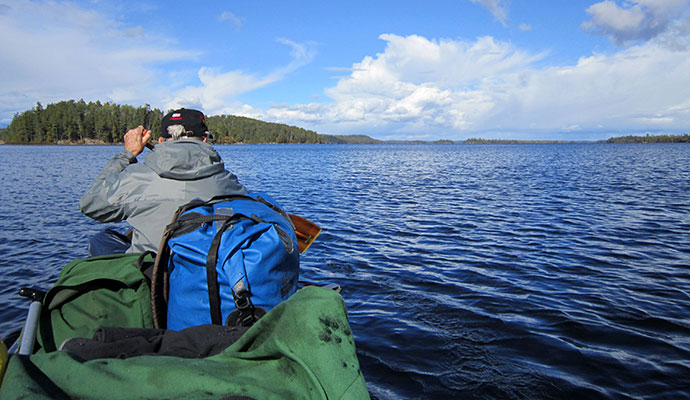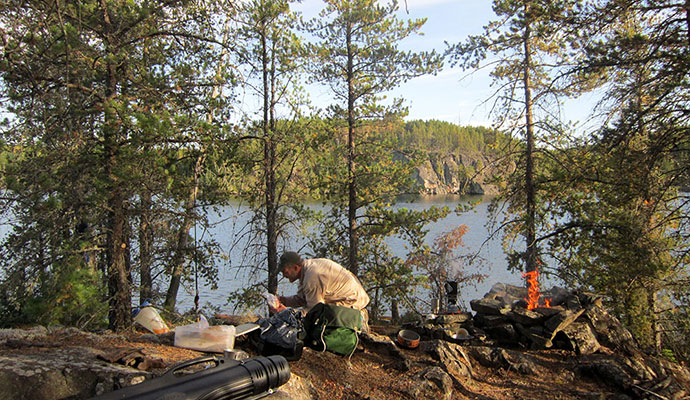My last trip into the wild
An old man, his son, and a canoe

A free daily email with the biggest news stories of the day – and the best features from TheWeek.com
You are now subscribed
Your newsletter sign-up was successful

The alarm goes off at 4:30 a.m. Waning crescent moon. Clear September sky. I alert my son in the adjoining bedroom. "Jimmy! Time to go!" We gulp coffee and depart hastily, leaving Sandy silhouetted in the glow of the garage light. She has fortified us amply for the long drive: sandwiches, oatmeal cookies, and a bagful of apples she picked in the orchard yesterday. With our shit-brindle brown canoe strapped on top of Jimmy's van and the interior crammed with gear, we munch our way north up Highway 23 across hilly Wisconsin farmland wreathed in mist, toward Reedsburg and the Interstate.
Ten sun-drenched hours later, we pull up to the outfitter's dock at the end of an inlet on Saganaga Lake, a couple of miles from the Canadian border. This is where the Gunflint Trail, a winding two-lane blacktop, terminates. On the Canadian side, Ontario's Quetico Provincial Park; on the Minnesota side, the Superior National Forest's Boundary Waters Canoe Area Wilderness. Together, 3,500 square miles of unadulterated getaway. More than a thousand lakes, many linked by rivers and historic portage trails. No roads, no resorts, no residents. Voyageur country. Moose country. Wolf country.
Jimmy, a modishly bewhiskered husband, father, musician, teacher, carpenter, and savvy outdoorsman, has been canoe camping here for years. He usually paddles solo. When he invited me to join him this time, I had my doubts. I wasn't the only one. My brother, Tom, said he thought even considering it at my age, seventy-five, was crazy. Sandy, too, was dubious.
The Week
Escape your echo chamber. Get the facts behind the news, plus analysis from multiple perspectives.

Sign up for The Week's Free Newsletters
From our morning news briefing to a weekly Good News Newsletter, get the best of The Week delivered directly to your inbox.
From our morning news briefing to a weekly Good News Newsletter, get the best of The Week delivered directly to your inbox.
I told Jimmy to count me in. Why? Partly because he and I had never done a canoe trip before, just the two of us. Partly because the more I thought about it the more I wanted to see the Boundary Waters again. Besides, I asked myself, how often does a codger like me — retired editor, cancer survivor, grandfather of eight, troublemaker — get a chance like this? Dude. Go for it.

(More from The Big Roundtable: The bridge to Sodom and Gomorrah)
I stepped up my workouts. Then my back started giving me trouble. When I warned Jimmy I was having second thoughts, he told me not to worry. "We'll take it slow and easy," he said. "No need to kill ourselves. Trust me: It'll be a piece of cake."
Now, road-weary but eager to start paddling, we learn there's good news and bad. There is enough daylight left, the outfitter assures us, for one of his boat hands to take us to a drop-off island. From there we should be able to reach the campsite Jimmy has in mind before dark. But a forest fire has shut down Monument Portage, a main gateway for parties embarking from the Gunflint. Our plan was to tackle Monument in the morning. Can we bypass it and still get where we want to go? Jimmy digs his maps out of a gear bag and quickly locates what appears to be another way in, on the Canadian side. It involves three portages not officially designated as such, and one unnamed lake. The outfitter takes a look, tracing the route with a stubby pencil. He says he thinks it should be doable.
A free daily email with the biggest news stories of the day – and the best features from TheWeek.com
The boat guy is waiting on the dock. We help him pile our stuff onto a bulky, beat-up aluminum craft with an overhead canoe rack and a vintage twenty-five horsepower Johnson outboard. Jimmy checks to make sure I've got a fleece under my windbreaker. We're in for a chilly, hull-slamming ride.
(More from The Big Roundtable: What does it mean to be Russian?)
Puttering cautiously at first, we wind through narrow shallows between stony hills studded with charred snags. Clunk. The propeller nicks a rock. "Water's low," the guy says. "It's been really dry this year." Short-cropped blonde hair, sturdy, early twenties. He informs us he's from Hibbing. Clunk. Jimmy replies, "Bob Dylan's hometown." The guy's impressed. "Wow! Hardly anybody knows that." Jimmy and I exchange a quick glance. It's the only thing anybody knows about Hibbing.

Then, suddenly, we're barreling full-speed into the exhilarating vastness of Saganaga. Bucking the wind, bashing across whitecaps. Thump! Thump! Thump! Piney islands dot the horizon like pincushions. Deep blue sky, verging on purple; enormous clouds. Thump! Thump! Thump!
Finally, Hook Island. From here on, motors prohibited; paddling only. Our chauffeur rams us onto a sandy beach. We unload and reload while the snarl of the departing boat fades away. First, two big green Hudson's Bay packs. The heaviest contains food, the other clothes, toilet paper, water filter, stove, gas canisters. Next, the blue waterproof pack (sleeping bags, tents, tarps) and Sandy's old purple backpack (hatchet, saw, rainwear, jackets, hats, gloves). Last: tackle box, fishing rods, paddles.
Jimmy grabs the gunnels and clambers across the cargo to the stern seat, and I shove off. Here we go! The canoe rides low but once we get underway it slices through the waves without shipping a drop. The island recedes.
So familiar, this feeling. When I was a kid, the mere act of setting out to go fishing in a rowboat was enough to inspire a frisson of anticipation. Now here I am all these years later experiencing the same thing, only more so. That's the magic of casting off. You never know what will happen next. Soon enough, though, you realize it's not the destination that matters: it's appreciating what you need to do to get there. Paddle, old-timer!
Two loons pop up nearby, beads glistening on their ebony heads. One has a minnow wriggling in its beak. An omen? They inspect us then disappear as abruptly as they surfaced.
(More from The Big Roundtable: My journey to the new Jerusalem)
Before we left the island, Jimmy showed me the campsite on the map. "That's pretty far," I said.
"Not really," he said. "Only a couple miles, if that."
"But it's getting dark fast. What if somebody's already there? We'll be screwed. Totally shafted."
"We'll be fine," he said, pretending to ignore my exaggerated panic. "We'll just find another place. Not a problem."
Not a problem for him, maybe. Already, my arms and shoulders are doing a slow burn.
I spot what we're shooting for, a point coming up on the right. But, no. We pass that point and keep paddling, toward another one we couldn't see before. It's so easy to get disoriented on big water. Hits you right away: no depth perception. Islands look like points, points look like islands, bays hide behind peninsulas. Everything runs together.
READ THE REST OF THIS STORY AT THE BIG ROUNDTABLE.
This story originally appeared at The Big Roundtable. Writers at The Big Roundtable depend on your generosity. All donations, minus a 10 percent commission to The Big Roundtable and PayPal's nominal fee, go to the author. Please donate.
-
 Are Hollywood ‘showmances’ losing their shine?
Are Hollywood ‘showmances’ losing their shine?In The Spotlight Teasing real-life romance between movie leads is an old Tinseltown publicity trick but modern audiences may have had enough
-
 A dreamy long weekend on the Amalfi Coast
A dreamy long weekend on the Amalfi CoastThe Week Recommends History, pasta, scenic views – this sun-drenched stretch of Italy’s southern coast has it all
-
 Can foster care overhaul stop ‘exodus’ of carers?
Can foster care overhaul stop ‘exodus’ of carers?Today’s Big Question Government announces plans to modernise ‘broken’ system and recruit more carers, but fostering remains unevenly paid and highly stressful